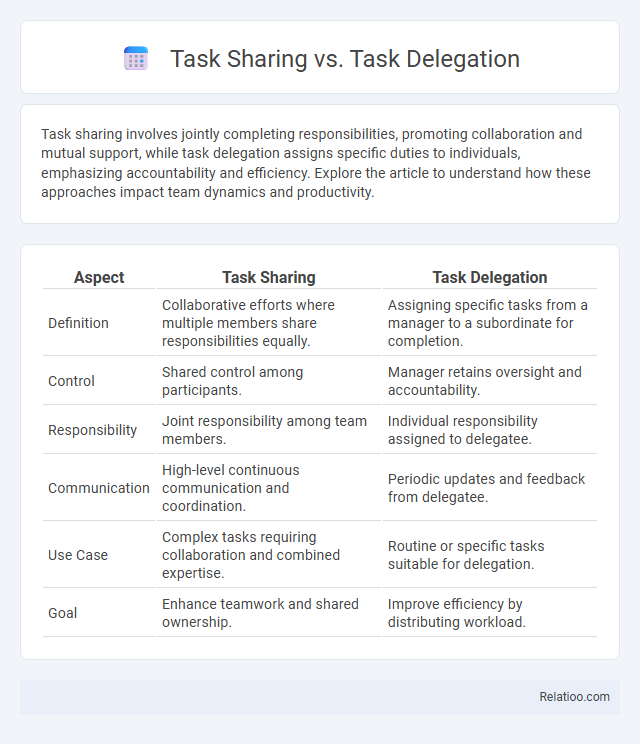Task sharing involves jointly completing responsibilities, promoting collaboration and mutual support, while task delegation assigns specific duties to individuals, emphasizing accountability and efficiency. Explore the article to understand how these approaches impact team dynamics and productivity.
Table of Comparison
| Aspect | Task Sharing | Task Delegation |
|---|---|---|
| Definition | Collaborative efforts where multiple members share responsibilities equally. | Assigning specific tasks from a manager to a subordinate for completion. |
| Control | Shared control among participants. | Manager retains oversight and accountability. |
| Responsibility | Joint responsibility among team members. | Individual responsibility assigned to delegatee. |
| Communication | High-level continuous communication and coordination. | Periodic updates and feedback from delegatee. |
| Use Case | Complex tasks requiring collaboration and combined expertise. | Routine or specific tasks suitable for delegation. |
| Goal | Enhance teamwork and shared ownership. | Improve efficiency by distributing workload. |
Introduction to Task Sharing and Task Delegation
Task sharing involves distributing portions of a project among team members who collaboratively contribute their expertise, enhancing efficiency and accountability. Task delegation, in contrast, assigns specific responsibilities to individuals based on their skills, allowing Your team to focus on their core strengths while ensuring clear ownership of tasks. Understanding the balance between task sharing and task delegation is essential for optimizing team performance and achieving project goals.
Defining Task Sharing
Task sharing involves distributing responsibilities among team members so that multiple individuals contribute simultaneously to the completion of a task, enhancing collaboration and efficiency. Unlike task delegation, where a task is assigned to a single person with clear accountability, task sharing promotes joint ownership and collective problem-solving. Your team's productivity can significantly improve when task sharing encourages active communication, resource pooling, and coordinated efforts.
Defining Task Delegation
Task delegation involves assigning specific responsibilities to individual team members while maintaining overall accountability for the outcome. Unlike task sharing, where tasks are distributed collectively among members, delegation clearly defines who is responsible for each task to ensure efficiency and clarity. Understanding task delegation empowers your team to optimize productivity by leveraging individual strengths and clarifying roles.
Key Differences Between Task Sharing and Task Delegation
Task sharing involves distributing responsibilities among team members who collaboratively handle portions of a task to achieve a common goal, enhancing collective input and accountability. Task delegation, on the other hand, assigns specific tasks to individuals, empowering Your team members with clear ownership and decision-making authority for their designated duties. Understanding these key differences optimizes workflow efficiency by balancing collaboration in task sharing with focused responsibility in task delegation.
Benefits of Task Sharing in the Workplace
Task sharing in the workplace enhances collaboration by distributing responsibilities evenly, reducing individual workload, and increasing overall productivity. Your team benefits from improved communication and skill development as members actively participate in shared tasks, fostering a sense of accountability and trust. This approach also promotes flexibility, enabling quick adaptation to changing priorities and boosting employee engagement.
Advantages of Task Delegation
Task delegation enhances productivity by assigning specific responsibilities to team members based on their skills, leading to efficient task completion and better time management. You benefit from increased focus on strategic activities while empowering your team, improving motivation and professional growth. Clear accountability established through delegation minimizes confusion, driving higher quality outcomes and overall organizational success.
Challenges and Limitations of Task Sharing
Task sharing presents challenges such as unclear role definitions, leading to overlapping responsibilities and potential conflicts within teams. Limited communication and coordination can hinder efficiency, causing delays and errors in task completion. Unlike delegation, task sharing requires continuous collaboration, which may strain resources and reduce accountability if not managed properly.
Common Pitfalls in Task Delegation
Task delegation often suffers from common pitfalls such as unclear instructions, lack of accountability, and inadequate follow-up, which can lead to misunderstandings and reduced productivity. You may experience mismatched task assignments when roles and responsibilities are not clearly defined, causing delays and frustration within the team. Effective delegation requires clear communication and trust to ensure tasks are completed efficiently without overburdening individuals.
Best Practices for Implementing Task Sharing and Delegation
Effective task sharing and delegation rely on clear communication of roles and responsibilities to ensure accountability and prevent overlap. Best practices include assessing team members' strengths, providing appropriate resources, and setting measurable goals to track progress. Utilizing collaborative tools enhances transparency and fosters a productive balance between shared and delegated tasks within teamwork dynamics.
Choosing the Right Approach for Your Organization
Choosing the right approach--task sharing, task delegation, or teamwork--depends on your organization's size, goals, and workforce skills. Task delegation assigns specific tasks with clear accountability, ideal for hierarchical structures, while task sharing involves collaborative responsibility, enhancing flexibility and knowledge transfer. Teamwork combines diverse skills for complex projects, fostering innovation and mutual support, making it crucial to evaluate task complexity and team dynamics to optimize productivity.

Infographic: Task Sharing vs Task Delegation
 relatioo.com
relatioo.com